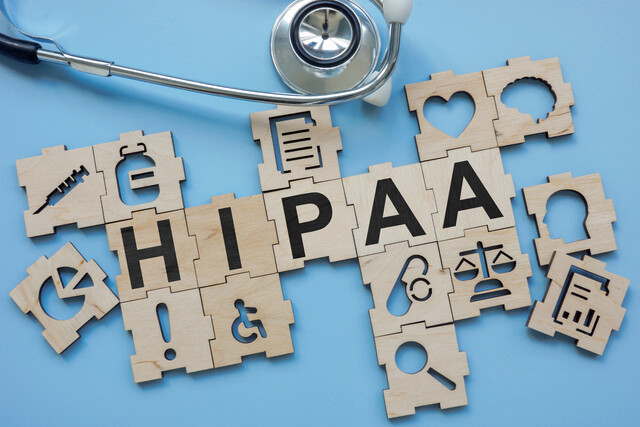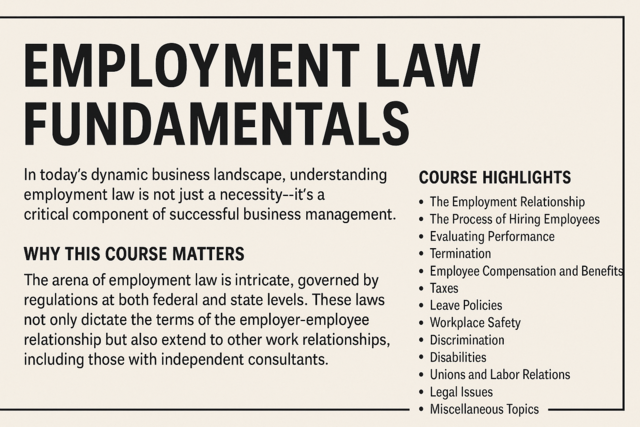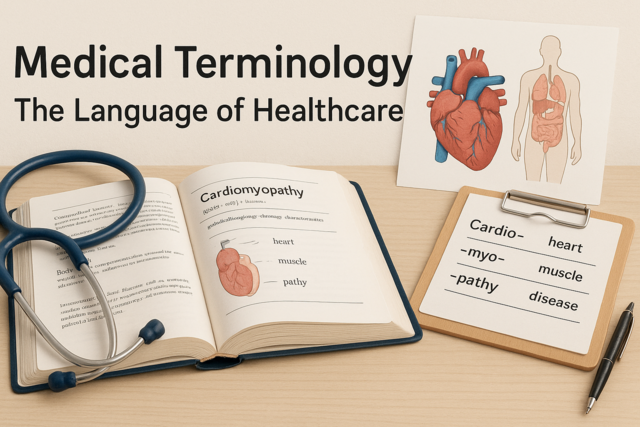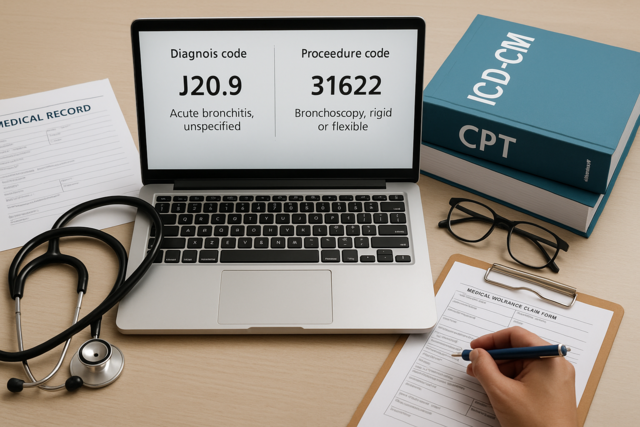Lesson 1. Eponyms vs. Descriptive Terms: Understanding Medical Vocabulary
Understanding medical terminology involves dissecting complex words, often based on Latin or Greek roots, into their fundamental parts like prefixes, root words, and suffixes. This systematic breakdown enables professionals to grasp the meaning of terms, even if the complete term initially appears daunting.
Lesson 2. The Language of Numbers and Colors in Medicine
Dive into the distinct dimensions of numerical and chromatic prefixes used in medical lingo--what do 'primi-' and 'milli-' share with 'porphyro-'? This lesson unfurls their semantic essences and historical contexts, bridging Latin and Greek roots to modern usage.
Lesson 3. The 'A' in Anatomy: Prefixes, Suffixes, and Roots
Learners explore medical terminology associated with 'A' by examining prefixes such as 'Ana-' for upward motion and roots like 'Acu/o-' implying sharpness, with an end-of-lesson quiz to test synthesis of knowledge gathered from numbers and colors in previous modules. This foundational knowledge aids in mastering medical linguistics.
Lesson 4. The Language of Medicine: Terms Starting with B
Explore the fascinating root word 'Bacill/o', which traces back to Latin origins, central to developing terms like 'Bacillus' and 'bacillary'. Encompassing bacteria-related words, it emphasizes the evolutionary path of medical language from the 1880s to modern usage.
Lesson 4. The Language of Medicine: Terms Starting with B
Explore the fascinating root word 'Bacill/o', which traces back to Latin origins, central to developing terms like 'Bacillus' and 'bacillary'. Encompassing bacteria-related words, it emphasizes the evolutionary path of medical language from the 1880s to modern usage.
Lesson 5. Alphabetical Anatomy: The Letter 'C'
This module covers extensive medical vocabulary under the 'C' category, linking them to historical etymology and practical usage. Learners enhance their understanding of medical jargon by seeing word roots like 'calc/o' and 'cerumin/o' in context.
Lesson 6. Exploring the Medical Lexicon: Understanding 'D' Terminology
Lesson Six delves into medical terms starting with 'D,' focusing on roots like 'dacry-' and 'dactyl,' which relate to tears and fingers or toes, respectively. This knowledge builds upon the understanding of previous lessons and emphasizes the creativity in forming new medical terminology.
Lesson 7. Advanced Study: Medical Prefixes, Suffixes, and Root Words Starting with 'E'
Exploring 'E' medical terminology, this lesson teaches the use of 'eal', 'ec-', and 'echin/o', building upon previous knowledge of terms from earlier alphabets. Master the art of crafting sophisticated medical lexicons by combining your new 'E' vocabulary with past learnings.
Lesson 8. The World of Medical Terms Starting with 'F'
Emphasizing the integration of prior lessons, this module dives into root words like 'femur' and 'fiber' to expand your medical vocabulary. It offers insights into the origins and usages of terms like 'fasciotomy' and 'ferritin' across various time periods.
Lesson 9. 'G' Medical Terminology: A Guided Exploration
Focusing on the letter 'G', students expand their vocabulary with terms from 'glial' to 'geriatrics', blending cultural roots from Greek to Latin. The lesson encourages using known prefixes and suffixes like '-gram' and 'gon/o' to form complex medical expressions.
Lesson 10. Exploring 'H' in Medical Terminology: From Hallucin/o to Hyster/o
Explore the world of medical terms beginning with 'H', from 'hem/o' meaning 'blood' to 'hyper-', denoting excess, developing skills to generate terms like 'hematocrit' and 'hypertension'. Combine these elements to enhance medical communication and comprehension.
Lesson 11. Probing the Prefixes, Roots, and Suffixes of 'I' in Medicine
Enhance your medical lexicon with Lesson Eleven by mastering terms beginning with 'I', including 'ichthy/o' and '-itis', for conditions and descriptions like 'ichthyosis' and 'appendicitis'. These terms, combined with your existing knowledge, allow for advanced medical communication.
Lesson 12. Exploring 'J' in Medical Terminology: Beyond the Basics
This lesson explores medical terms starting with 'J', enhancing prior knowledge on terms connected to numbers, colors, and letters from 'A' to 'I'. Key terms include 'juxtaposition', 'jaundice', and 'jejunum', each with historical roots and specific medical relevance.
Lesson 13. Delving into Medical Lexicon: 'K' Edition
Lessons in 'K' medical terms provide a foundation for intricate word formation, with roots like Ket/o for ketones and Kines/o for movement, shown in words such as ketone and kinesthesia. This knowledge enhances the ability to decode medical language systematically.
Lesson 14. Leaping into 'L' Terminology
Delving into 'L' themed medical terminology, the lesson elucidates the meanings of roots like linguo- and lamino-, helping you become fluent in identifying their use and context in medical discourse. This knowledge is pivotal for navigating medical language with accuracy and clarity.
Lesson 15. From Macro to Myxoma: Medical Prefixes and Suffixes with 'M'
The lesson delves into the meanings and origins of medical terms starting with 'M', such as malabsorption ('bad' absorption) and macrocephaly ('large' head). Learners are encouraged to synthesize this new vocabulary with previous lessons for comprehensive language development.
Lesson 16. Mastering 'N' in Medical Terminology: Delving into Neural and Nocturnal Nuances
Effortlessly enrich your medical vocabulary by delving into 'N' words that signify meanings ranging from 'death', 'nerve' to 'sodium'. The lesson empowers you to transform roots like 'necr/o' and 'neur/o' into terms like 'necropolis' and 'neuron'.
Lesson 17. Navigating 'O' Medical Vocabulary
Focusing on 'O', this lesson teaches terms such as 'ocul/o' meaning 'eye', which creates words like 'ocular' and 'oculomotor'. It integrates these with previously learned terms for advanced medical terminology.
Lesson 18. Exploring 'P': From Pachyderma to Phobia - Uncovering Medical Terms
Exploring the prefix 'Pachy-' and other 'P' terms, this lesson encourages students to build on established medical terms, integrating historical linguistic roots from Greek and Latin, and forging a deeper understanding of medical language construction. Through creative synthesis, learners enhance their ability to develop complex medical terms.
Lesson 19. Dive into 'P': Roots and Prefixes in Medical Science
Roots like 'Psych/o' imply mental health focus areas seen in 'psychology' and 'psychosis,' while 'Purul/o' denotes pus-related conditions. Prefixes starting with 'Py-' broadly cover fever-related terms like 'pyrexia' and interventions such as 'antipyretic' for managing fevers.
Lesson 20. Medical Terms Beginning with 'Q'
Lesson Twenty delves into medical terms starting with 'Q', building on previously learned language foundations. From 'quadriceps' to 'quotient', the lesson provides an insightful exploration of terms involving quantities, qualities, and characteristics.
Lesson 21. Deciphering Medical Jargon: The Letter 'R'
Key root words such as 'Rachi/o' for the spine and 'Radi/o' for x-rays form the basis of many essential medical terms in this lesson. Suffixes like '-Receptor' and prefixes such as 'Re-' expand students' vocabulary by allowing them to create terms describing anatomical functions and processes.
Lesson 22. Understanding Medical Vocabulary: The Letter 'S'
Delve into medical terminology with 'S' words like 'saprophyte' and 'sarcoma', which reveal the usage of roots 'sapr/o' and 'sarc/o' to understand concepts of decay and malignant growths. Connecting prefixes and suffixes with roots enables the creation of descriptive terms explaining medical conditions and structures.
Lesson 23. The 'T' Terminology Toolkit
In this lesson, learners explore the vast field of medical terminology with a particular focus on the letter 'T', expanding their vocabulary through examples such as 'tachycardia', which refers to an excessively rapid heartbeat. Building on previously acquired knowledge, these terms are integrated to form more intricate medical terms.
Lesson 24. Mastering Medical Prefixes and Suffixes of 'U'
This lesson guides students through the intricacies of medical terms starting with 'U', emphasizing the use of prefixes like 'uni-' for one and 'ultra-' for beyond. By combining these with other linguistic elements, learners expand their professional vocabulary.

22 Hours average completion time
2.2 CEUs
30 Lessons
63 Exams & Assignments
8 Discussions
29 Videos
35 Reference Files
25 Articles
Mobile Friendly
Last Updated January 2026
























